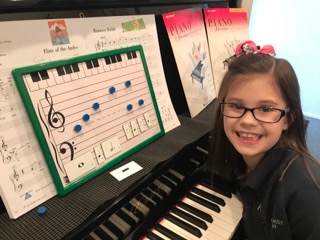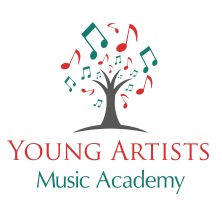Piano Lessons
Private lessons are available for students starting at the age of six. Private lessons allow for the teacher to tailor each lesson to the student's individual needs and goals. In each lesson, students learn music theory, rhythm, proper technique, and music literacy. While most of the repertoire we teach is classical, students may learn a variety of styles of music including pop, jazz and holiday music.
Private lessons are scheduled at the same day and time each week. Students may sign up for a 30, 45, or 60-minute lesson. Most beginners start with a 30-minute weekly lesson.
Private piano study is a year-round activity requiring consistency and dedication. It is best suited for families that list music lessons as a "top three priority" in their schedule.
FAQ - Frequently Asked Questions
Do we need a piano to start?
Students must have an instrument at home for daily practice. Pianos should be in good working condition and tuned regularly. An acoustic piano should be tuned twice per year. Out-of-tune instruments that are not maintained do a disservice to the student. Although an acoustic piano is strongly recommended, as nothing can replace its touch and sound, a digital keyboard with 88 weighted keys, foot pedal, and a bench at the proper height is an acceptable alternative with the understanding that as the student advances, an acoustic piano will be highly encouraged.
How much will the student need to practice?
The amount of practice time directly affects progress and should be established into the student's daily routine. All students are expected to practice on a regular basis. As a general rule, a child should practice 5 days a week at a length of time twice their age (ex: 7 years old = 14 minutes a day, 5 days a week). Practice strategies will be discussed each lesson to help the student refine practice skills.
Do students have the opportunity to perform?
Public performances are an important part of piano study. Students are strongly encouraged to participate in studio events, festivals, and our annual Spring Recital.
What music and materials are required?
Your teacher will recommend the best course for each student. Our curriculum includes repertoire, technique and theory books for each level of study. In addition, the student should have a metronome for practice.
What are the parent's responsibilities?
Set aside a scheduled practice time for your child. It is important to budget time for practicing and to make it happen as part of a daily routine. For elementary-age children, please supervise home practice sessions, making sure your child completes each assignment. Many young children are not disciplined enough to manage practicing without your support. Be involved with this activity and give it the same value as you do other activities in which your child is involved. Learning to play the piano requires consistency and a long-term commitment.

